英国人这样的加(add)油(oil)中国人觉得还给力(gelivable)吗?
今日话题
天气转凉,年终将至,大家是否已然萌发了去冬眠的欲望?
不过解锁手机看到各大品牌蓄势待发的短信、微信预付定金推送,时刻提醒着你打起十二分的精神去迎接接踵而至的万圣节、双十一、圣诞节、元旦、春节、情人节、妇女节……荷包瘪瘪的你亟需一句简短而有力的鼓励:加油!
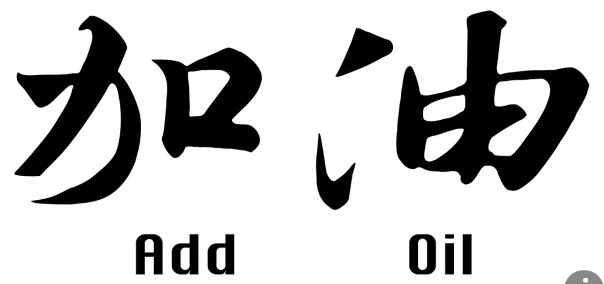
这几天,中文词语“加油”上了不少外媒的热搜。因最具权威的《牛津英语词典》(Oxford English Dictionary简称OED)在10月3日最近一次的季度更新中新增了一批总数达1400多个的新词新义条目,而中式英语“add oil”,直译自中文的“加油”也赫然在列,和其他中式英语“lose face”(丢脸)、“long time no see”(好久不见)等词一起,正式成为“合法”的英语词汇。
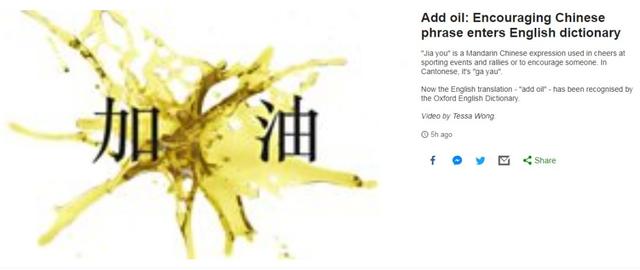
(Via BBC)
而牛津词典编撰团队这波不动声色的操作最先是被词典学专家,台湾东吴大学英文系副教授曾泰元(Hugo Tseng)发现的。

(Via The Straits Times)
新加坡媒体《海峡时报》对曾的发现进行了报道。
The discovery was made by Associate Professor Hugo Tseng from Taiwan's Soochow University, who wrote a column about his finding in Hong Kong's Apple Daily on Sunday (Oct 14).
台湾东吴大学英文系副教授曾泰元在10月14的台湾版香港苹果日报专栏中撰文发表了这一发现。
"To directly translate 'jia you' into 'add oil' - this is a form of Chinglish that many English teachers will correct. However, it has become popular to the point that the Oxford English Dictionary has accepted it and recognised its place," he wrote in Mandarin.
(Via Jia you! Phrase ‘add oil!’ added to Oxford English Dictionary)
曾用中文写道:“把‘加油’直译为‘add oil’,这原本是个搞笑的中式英语,许多英文老师都会批评纠正,想不到后来流行日广,居然连最权威的OED也收了,承认它的合法地位。”
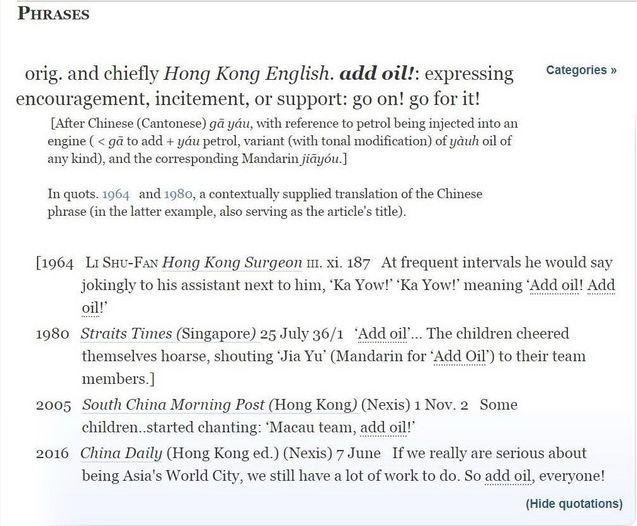
(Via Tw.appledaily.com)
曾教授在文中介绍道:OED在词源(etymology)里追根究底,说add oil这个片源直译自中文的“加油”,广东话念ga yau,相当于国语的jiayou,并说文解字了一番。
他还谈道:“中文的‘加油’可以用在不同的场合,英文里想找道地(地道)的对应,得视情况而定,不能一概而论。”
此次的发现是曾教授长期关注OED更新的结果。
他谈到早在2008年北京奥运时,英文媒体上jiayou(加油)就用得很多,进入英文的呼声很高,许多人都在屏息以待。因此,每次OED做季度更新之时,他都会仔细浏览官网的新词表,看看“加油”收进去了没有。
不过让他意外的是此次“加油”并不是以音译的jiayou进入OED,而是直译的add oil。
英文媒体Shanghaiist也对这一中式英语新词进入OED发表了报道。
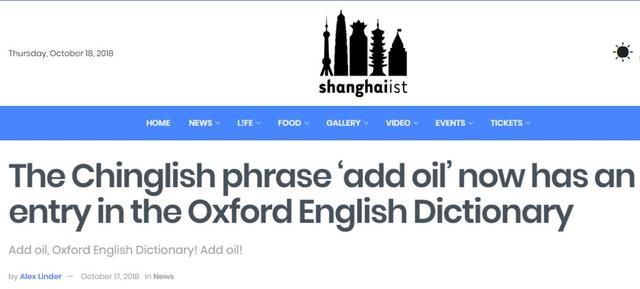
(Via Shanghai.ist)
“Add oil” is a direct English translation of the Chinese phrase “jiāyóu”(加油), an exclamation used frequently across China to express encouragement or support for someone else. Despite the phrase being one of the most widely used in the Chinese language, it’s always been difficult to come up with an appropriate way to translate it into English, because of the expression’s versatility, leading some to go with the jokey literal translation.
“Add oil”是中文词语“加油”的英语直译,是常用的感叹语,用于表达鼓励和支持某人。尽管它是中文世界里运用最为广泛的词汇之一,却因其运用场合的多样性,很难用一种英语表达准确地进行翻译,以至于有些人就用这种搞笑的直译方式加以翻译。
另两个被OED认可的典型搞笑式中式英语就是“long time no see”(好久不见)和“lose face”(丢脸):


(Via 观察者网)
还有一个大家可能不太熟悉,但也出自洋泾浜英语“no can do”(做不到):

(Via 观察者网)
不过,Shanghaiist也指出,“加油”并非出现在最新一次的词条更新中。
In a 2016 blog post, OED editors did at least say that they were researching the expression.
早在2016年,OED的编撰团队就在博客中声称他们正在对“加油”这个表达进行研究。
另外,早在4年前就有传闻,词典团队正考虑把“tuhao”(土豪)、“dama”(大妈)等词也一并收录了,不过后来消息石沉大海。但这些词或许会出现在未来的版本中,也犹未可知。
除了这些曾被英文媒体广泛引用但未被官方英文词典收录的中式英语之外,还有不少在中国网友间广泛使用和传播的中式英语。许多网友在微博上留言了各种“中式英语”,探讨它们何时会被官方词典收录。








那OED的编撰团队是如何选择入选的新词的呢?
港媒《南华早报》对此进行了介绍。
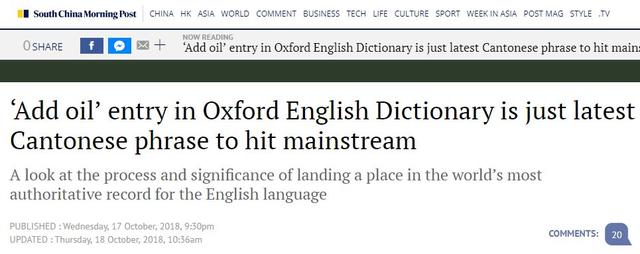
(Via SCMP)
Then how and where are the words selected from?
Dictionary words are analysed and extracted – often by software – from a corpus, a database of texts of written or spoken language that provide evidence of how English words are used in everyday situations, sometimes spanning centuries, all over the world. Examples include the publisher’s own Oxford English Corpus, which contains 10 billion documented words, the international Bank of English and the Corpus of Contemporary American English. Based on this research, professional lexicographers write the actual dictionary entry.
那这些词是如何以及从哪里选来的呢?
字典词语通常由软件分析和提取——来自语料库,书面或口头语言文本数据库,它们提供英语单词如何在日常情况下使用的证据,有时跨越几个世纪,遍布全世界。例如出版商自己的牛津英语语料库,其中包含100亿个有文字记录的单词,国际英语银行和当代美国英语语料库。基于这项研究,专业词典编纂者编写实际的词典条目。
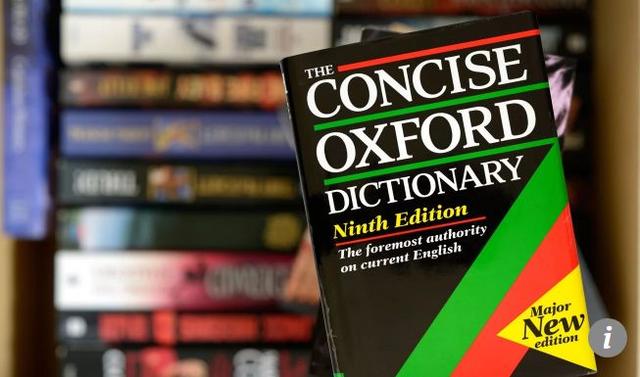
(Via SCMP)
How does a word get into the OED?
According to Oxford University Press, a word must require sufficient independent examples of use over a “reasonable amount of time” to be considered for inclusion. The publishers also consider whether the word has reached a “level of general currency”, that is, understood by readers without the need of an explanation of its meaning.
一个词如何被收录进OED?
根据牛津大学出版社的说法,一个词必须要求在一段“合理的时间”内具备充分独立使用的例子才能被纳入考虑范围。出版商还会考虑这个词是否已达到“普遍接受水平”,即读者无需释义便知其义。
随着越来越多的“中式英语”被收录进权威英语词典,许多中国网友对这一现象表达了内心的激动之情~







你对这个现象怎么看?欢迎分享你的经历和观点!

文:Du Qiongfang
图:外媒、观察者网、微博
题图:SCMP



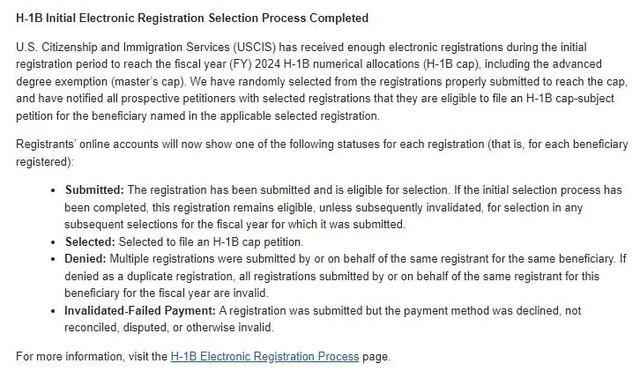

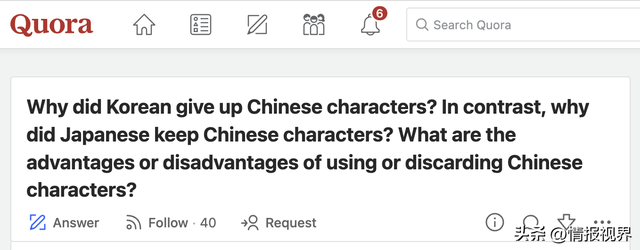















评论